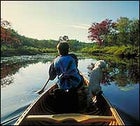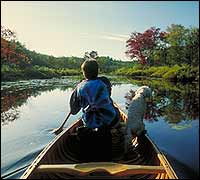If your mental image of coastal South Carolina consists mainly of Myrtle Beach’s six-lane traffic jams, all-you-can-eat fried seafood buffets, and Dolly Parton’s Dixie Stampede theater, you need to let your mind—and your body—wander a little farther south, where the so-called ACE Basin provides a natural oasis in a wasteland of kitsch. Here, sandy mainland beaches give way to nubby islands, grassy marshes, cypress-gum swamps, and slow-moving rivers that empty into tidal estuaries teeming with birds and wildlife. Known by local paddlers as the “pearl of the low country,” this wetlands sanctuary is where boaters strategically place themselves in the fall, when the temperatures and mosquitoes taper off, migratory birds arrive, and hardwoods blaze yellow and crimson in the late-afternoon sun.

The rivers in the ACE Basin—an acronym for the tongue-tying Ashepoo (pronounced ASHY-poo), Combahee (CUM-bee), and Edisto (ED-isto)—meander silently across the coastal plain from distant high-country origins, converging at St. Helena Sound, where they blend into the Atlantic. The largest of the trio, and the longest blackwater river in North America, is the Edisto, which rolls more than 300 miles from its headwaters near Aiken. The most scenic, however, is the Combahee, which harbors swamp forests with ancient stands of buttressed bald cypress, river-bluff plantations the likes of which provided a backdrop for Forrest Gump’s adolescent misadventures, and rice fields dating back to the 1800s (now kept flooded for waterfowl by the administrators of the ACE Basin National Wildlife Refuge). Lying in between, both physically and aesthetically, is the Ashepoo, which winds through bottomland hardwoods and tidewater rice fields as it snakes its way seaward. Along all three you’re likely to sight signs of the 16 endangered species that make their homes in the basin. Look for bald eagles soaring overhead, wood storks wading in the shallows, or loggerhead turtles basking on the rocks.
Canoeists and kayakers can put in at any of the various launches within the 350,000-acre basin. Coastal Expeditions, an outfitter in Mount Pleasant (10 miles east of Charleston), sells a map of the basin’s put-ins from the coast to about two hours inland ($9; 843-884-7684). But if you’d rather not go it alone, call South Sport in Walterboro (800-785-2925) and ask for Scott Leonard, a swamp-savvy guide who leads trips on any of the three rivers and will give clients a thorough grounding in the area’s wildlife and ecology. Carolina Heritage Outfitters (800-563-5053) in Canadys offers guided full-day kayak tours ($65-$85) on the Edisto, which flows right outside its back entrance. But you may want to opt for the two-day guided trip ($285), which includes a Robinson Crusoe-like sleepover in a tree house within the Edisto River Refuge. Carolina Heritage also rents solo kayaks ($20 per day) and canoes ($42 per day), so you can walk out the door with a boat in hand and be on the river in five minutes flat.
Since most land in the basin is private property, public campsites are precious commodities. Some good ones, however, can be found at Colleton State Park, the unofficial headquarters of the Edisto River Canoe and Kayak Trail ($10; 843-538-3659). A more luxurious option is to base yourself in Charleston’s downtown historic district, less than an hour away, which should allow you some time to explore the city’s myriad museums, pre-Revolutionary buildings, and open-air markets. The most atmospheric place to bed down is the Lodge Alley Inn ($160; 800-845-1004), a complex of restored 18th-century warehouses with high-ceilinged, fireplace-endowed rooms. Meanwhile, to savor Charleston’s low-country cuisine—she-crab soup, broiled grouper, buttermilk biscuits, and the like—try Poogan’s Porch on Queen Street (843-577-2337) or Henry’s on the Market (843-723-4363), both of which date back to the 1890s. Still, don’t get too caught up in the city’s genteel hospitality: The next morning it’s back out to the basin, with its golden salt-marsh cordgrass waving in the breeze, the wood ducks and tundra swans alighting from the north, and views stretching all the way out to the frothing sea. This, after all, is the reason you kept heading south in the first place.


